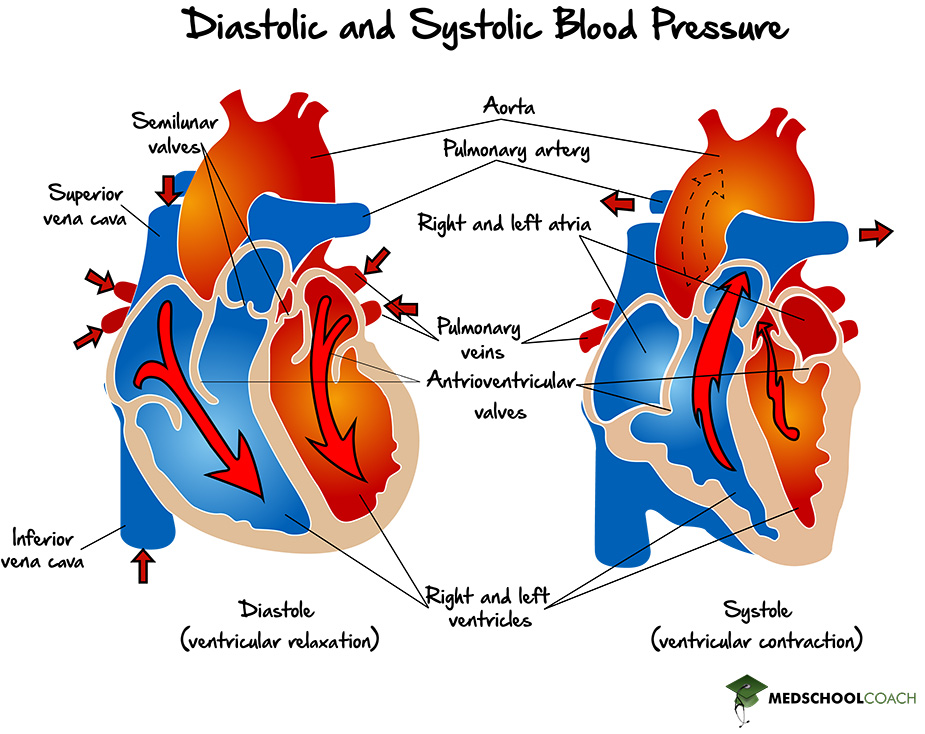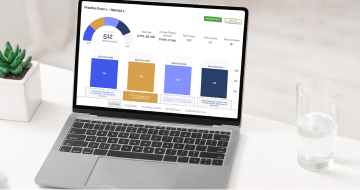Blood Pressure
MCAT Biology - Chapter 7- Section 4.4 - Organ Systems - Circulatory System
- Home
- »
- MCAT Masterclass
- »
- Biological and Biochemical Foundations of Living Systems
- »
- Biology
- »
- Blood Pressure – MCAT Biology
Sample MCAT Question - Blood Pressure
Which of the following best describes the concept of diastolic blood pressure?
a) It is the highest pressure measured during a period of one heartbeat
b) It the lowest pressure measured during a period of two heartbeats.
c) It is the highest pressure measured when the ventricles contract.
d) It is the lowest pressure measured during a period of one heartbeat
B is correct. Diastolic blood pressure is the lowest pressure measured during a period two heartbeats.
Blood pressure is composed of both the systolic and diastolic pressures. The systolic pressure is the highest pressure in one heartbeat, and it is the highest pressure when the ventricles are contracting. Diastolic pressure, on the other hand, is the lowest pressure in two heartbeats, and it represents the pressure when the ventricles are relaxed and filling with blood.
Get 1-on-1 MCAT Tutoring From a Specialist
With MCAT tutoring from MedSchoolCoach, we are committed to help you prepare, excel, and optimize your ideal score on the MCAT exam.
For each student we work with, we learn about their learning style, content knowledge, and goals. We match them with the most suitable tutor and conduct online sessions that make them feel as if they are in the classroom. Each session is recorded, plus with access to whiteboard notes. We focus on high-yield topics if you’re pressed for time. If you have more time or high-score goals, we meticulously cover the entire MCAT syllabus.
What Is Blood Pressure?
Blood pressure is the measure of the pressure, or force, of the blood circulating throughout the body on the walls of the blood vessels. Blood pressure is directly related to the heart. When the heart contracts, the pressure of blood in the vessels increases. When the heart relaxes, the pressure of blood in the vessels decreases.
Systolic vs Diastolic Blood Pressure
There are two important terms when it comes to blood pressure – systolic blood pressure and diastolic blood pressure (Figure 2). The systolic blood pressure is the highest pressure in the span of one heartbeat. In other words, it is the highest pressure when the ventricles contract. The diastolic blood pressure is the lowest pressure measured over the span of two heartbeats. In other words, it is the pressure when the ventricles are relaxing and filling with blood.
In normal, healthy humans, the expected systolic pressure over diastolic pressure is about 120 over 80 mm Hg. Sometimes an individual’s blood pressure may be too high or too low, and many times this can be caused by an underlying disease, such as hypertension or kidney disease. However, many times changes in blood pressure are normal physiological responses and are not the sign of disease.

Mechanisms of Blood Pressure Change
Three different factors can change blood pressure.
The first factor is changes in blood volume. Blood vessels are sort of like a container for blood, and drinking more fluid, such as water, will increase the blood in the container. More volume in the same-sized container will increase the pressure in the container. In this way, drinking more fluids increases blood pressure. Similarly, drinking less fluids means there is less volume in the container. In this way, dehydration leads to a decrease in blood pressure.
Another factor that can affect blood pressure is peripheral resistance. Instead of changing the volume of blood in the container, changing the size of the container can also lead to blood pressure fluctuations. Constricting the blood vessels decreases the vessel diameter. Decreasing the vessel diameter increases the peripheral resistance, which in turn increases the blood pressure. Contrastingly, dilating the blood vessels increases the vessel diameter, which in turn decreases the peripheral resistance and blood pressure.
The third factor that can affect blood pressure is cardiac output. Cardiac output is defined as the volume of blood pumped from the heart per minute. It is equal to the product of the heart rate, or the beats per minute of the heart, and the stroke volume, or the volume of blood pumped per heartbeat. Increasing the cardiac output, either by increasing the heart rate or the stroke volume, will also increase the blood pressure. Usually, if an individual is at rest, heart rate and stroke volume are relatively low. However, during strenuous exercise, such as running, both heart rate and stroke volume increase in order to deliver more blood, and therefore, more oxygen throughout the body. An increase in heart rate and stroke volume will lead to an increase in blood pressure as well.
Explore More MCAT Masterclass Chapters
Take a closer look at our entire MCAT Masterclass or explore our Biochemistry lessons below.

One-on-One Tutoring
Are you ready to take your MCAT performance to a whole new level? Work with our 99th-percentile MCAT tutors to boost your score by 12 points or more!
See if MCAT Tutoring can help me
Talk to our enrollment team about MCAT Tutoring

MCAT Go Audio Course
Engaging audio learning to take your MCAT learning on the go, any time, any where. You'll be on the way to a higher MCAT score no matter where you are. Listen to over 200+ lessons.

MCAT Practice Exams
Practice makes perfect! Our mock exams coupled with thorough explanations and in-depth analytics help students understand exactly where they stand.

MCAT Prep App
Access hundreds of MCAT videos to help you study and raise your exam score. Augment your learning with expert-created flashcards and a question banks.